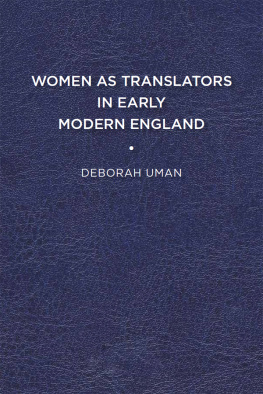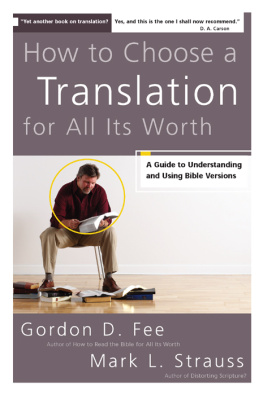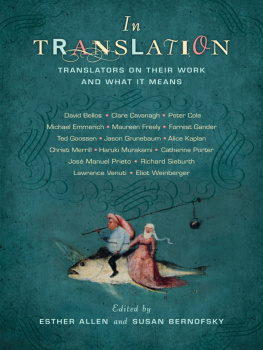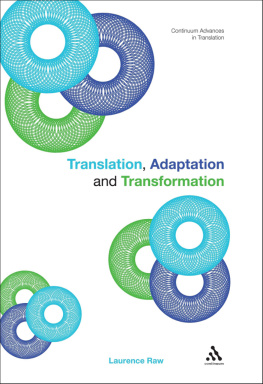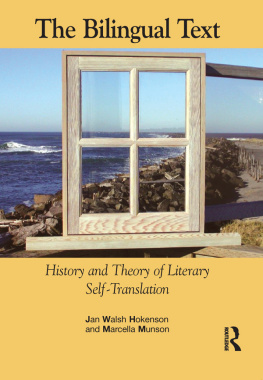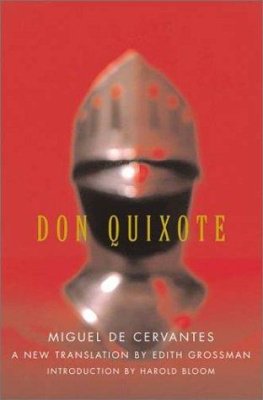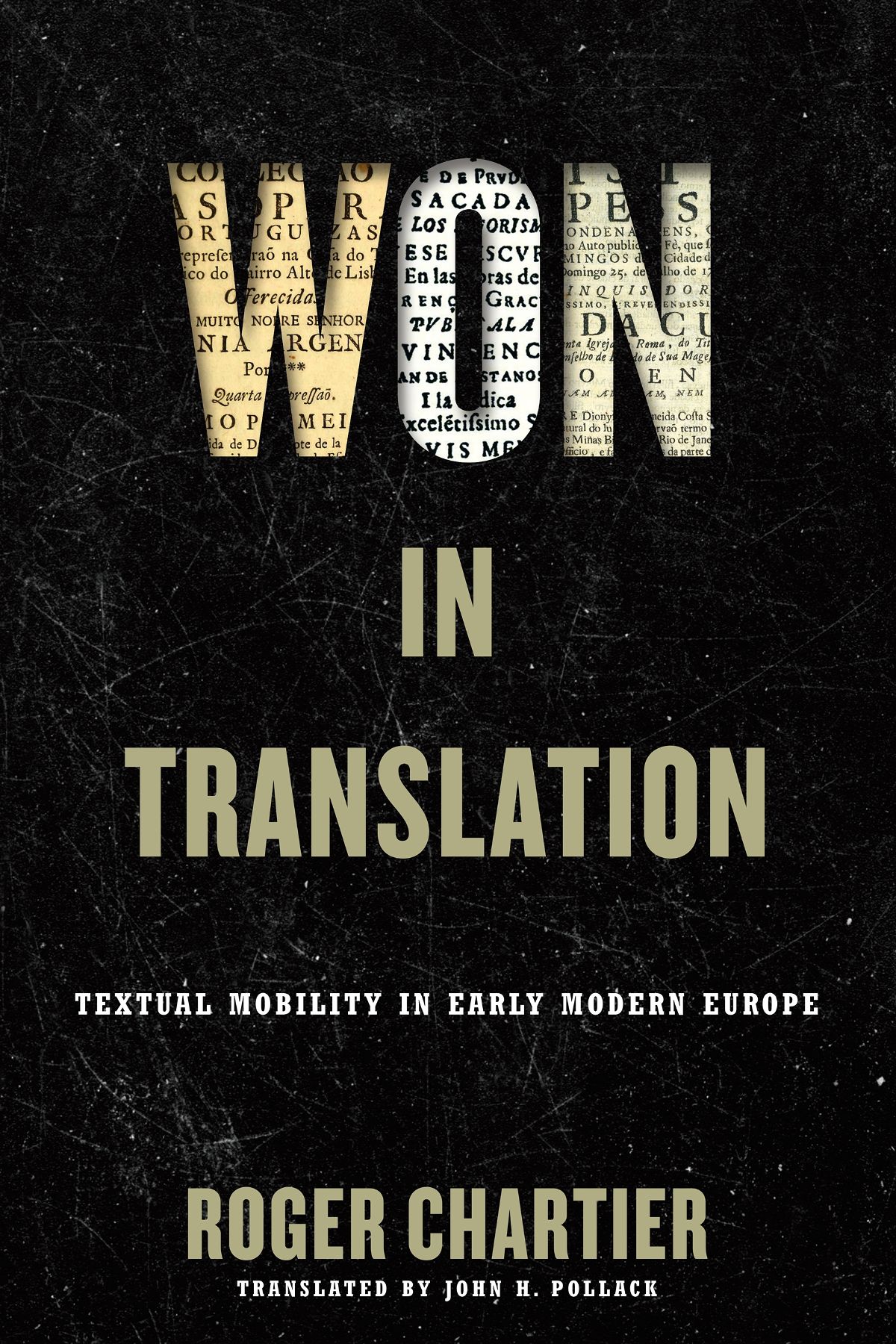Anthony Grafton Michael F. Suarez, S.J.
A complete list of books in the series is available from the publisher.
Won in Translation
Textual Mobility in Early Modern Europe
Roger Chartier
Translated by John H. Pollack

University of Pennsylvania Press
Philadelphia
Copyright 2022 University of Pennsylvania Press
All rights reserved. Except for brief quotations used for purposes of review or scholarly citation, none of this book may be reproduced in any form by any means without written permission from the publisher.
Published by
University of Pennsylvania Press
Philadelphia, Pennsylvania 19104-4112
www.upenn.edu/pennpress
Printed in the United States of America on acid-free paper
10 9 8 7 6 5 4 3 2 1
Hardcover ISBN: 978-0-8122-5383-2
Ebook ISBN: 978-0-8122-9844-4
Library of Congress Cataloging-in-Publication Data
Names: Chartier, Roger, author. | Pollack, John, translator.
Title: Won in translation : textual mobility in early modern Europe / Roger Chartier ; translated by John H. Pollack.
Other titles: Material texts.
Description: 1st edition. | Philadelphia : University of Pennsylvania Press, [2022] | Series: Material texts | Includes bibliographical references and index.
Identifiers: LCCN 2021042948 | ISBN 978-0-8122-5383-2 (hardcover)
Subjects: LCSH: Casas, Bartolom de las, 14841566. Brevsima relacin de la destruccin de las Indias. | Gracin y Morales, Baltasar, 16011658. Orculo manual y arte de prudencia. | Vega, Lope de, 15621635. Fuente Ovejuna. | Silva, Antnio Jos da, 17051739. Vida do grande D. Quixote de la Mancha e do gordo Sancho Pana. | Cervantes Saavedra, Miguel de, 15471616. Don Quixote. | Spanish literatureClassical period, 15001700TranslationsHistory and criticism. | Spanish literatureClassical period, 15001700History and criticism. | LiteratureTranslationsHistory and criticism. | Translating and interpretingEuropeHistory.
Classification: LCC PQ6066 .C47 2022 | DDC 468/.04dc23
LC record available at https://lccn.loc.gov/2021042948
Contents
The four chapters of this book address the same topic: the mobility of texts, or, put another way, the plurality of texts that circulate the same work. In early modern Europe, such mobility was the result of different decisions or choices made by all those individuals who not only made the books but also, and more fundamentally, made the texts. These actors included copyists, who established fair copies of authors autograph manuscripts; censors, who suppressed or corrected texts as they thought necessary; publishers (who were at that time both printers and booksellers), who made the decision to publish and chose format, layout, and fonts; copy editors, who prepared the copy text for the printer; and compositors, whose habits and preferences gave material forms to printed texts. In some cases, the chain of interventions that produced the forms and meanings of texts was still more complex. This was true of translations. Through their lexical, aesthetic, and cultural decisions, translators were able to assign new signification or new status to the works they translated. It was also the case with all the texts that were spoken before they were printed, such as speeches, sermons, or plays. The case studies gathered in this book are devoted to textual migrations moving from one language to another, or from one genre to another: for example, from historical chronicle or prose narrative to dramatic plays.
Three out of these four chapters are dedicated to Spanish texts, and the fourth one to a Portuguese adaptation of Don Quixote. This attention to Iberian materials continues studies I have previously devoted to the French translation and editions of Francisco de Quevedos Buscn; to Lope de Vegas Arte nuevo de hacer comedias en este tiempo; to different chapters of Don Quixote; and to English and French theatrical appropriations of Cervantess historia, beginning with the lost Shakespearean Cardenio. The prominence of these texts here is grounded in powerful historical realities. In early modern Europe, the Castilian language was considered by many writers (for example, Ronsard) as the least imperfect of all modern languages, and it became the vehicle for the most exciting literary novelties: chivalric romances, picaresque autobiographies, the new comedia, and a work that trespassed all the conventional genres, the history of the errant knight who named itself Don Quixote of La Mancha. Read in Spanish by all those who learned the language, translated for those who could not, and imitated and adapted by many, this textual repertoire had only Petrarch, Ariosto, or Tasso as serious competitors.
Paradoxically perhaps, the two Castilian works whose translations are analyzed in this book are neither romances nor plays. But they traveled throughout Europe and were translated more often than any other books. Bartolom de las Casass Brevsima relacin, printed in 1552 in Seville, was the most widely circulated denunciation of the tyrannies and cruelties committed by the Spaniards in the New World. The text was a powerful instrument for the construction of what was called much later the black legend of the Spanish monarchy. Across Europe, translating, commenting upon, and illustrating Las Casass short book was a way of warning all peoples threatened by the Spanish power and showing them that they could be, in their turn, the Indians of Europe. Reading Las Casas was necessary to ward off such mortal peril.
Baltasar Gracins Orculo manual, published in 1647 in Huesca, did not have the same immediate success. It is only with its French translation in 1684 that the book became a European steady seller. Itself then translated into several languages, the French translation transformed Gracins aphorisms, addressed to those few who could understand them, whatever their social condition, into a courtiers manual. Gracins three hundred maxims became, therefore, the indispensable guide for all those who desired to know, to practice, or to imitate the behaviors governing the court society. These two works are examples of the great power of translations. They gave new relevance to Las Casass Relacon by relocating it in multiple and successive contexts. They attributed a radically new meaning to Gracins Orculo.
Two chapters are dedicated to plays, one by Lope de Vega, the other one by Antnio Jos da Silva. The textual migrations that are at stake here are different. Lopes Fuente Ovejuna, printed in 1619, allows us to understand how the same story could be moved from historical chronicle to dramatic performance, and how this shift permitted, or required, the imposition of reconstructed representation of a past event. Lopes play also allows us to analyze two fundamental textual trajectories: from the composition of a play by a dramatist to its production by a theatrical company, and from the staged performance to the printed publication. Both processes were characterized by constraints and competitions, rivalries and ruses, that were not unique to Golden Age Spain.
Antnio Jos da Silvas Vida do grande D. Quixote provides another example of migration between genres. This play, performed by the puppets of the Theater of the Bairro Alto in Lisbon in 1733, is one of the numerous theatrical adaptations of Cervantess history of Don Quixote, in this case, of the second part of the book. As in the case of Lopes play, the shift from one genre to another allows the playwright to introduce new motives, to reinterpret famous passages, and to show inventiveness within the obligation of imitation. However, Silvas


